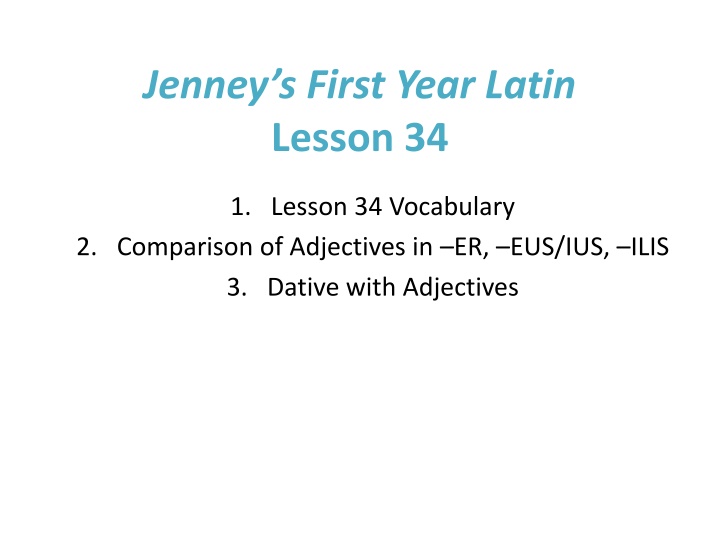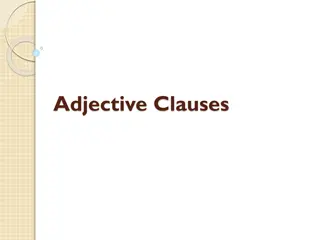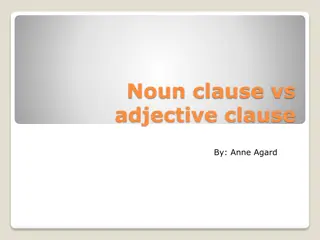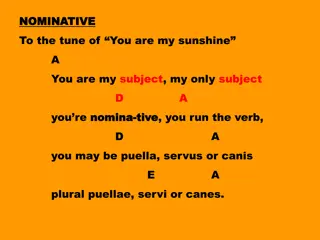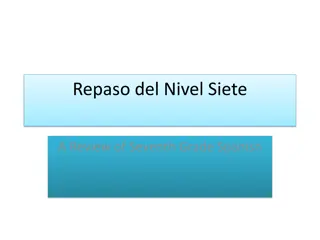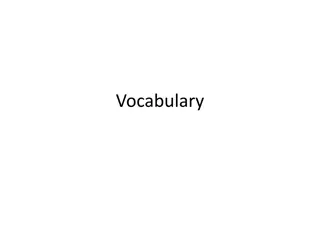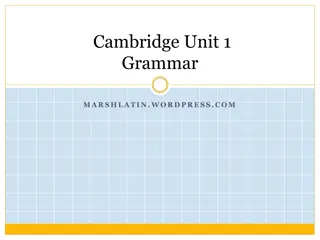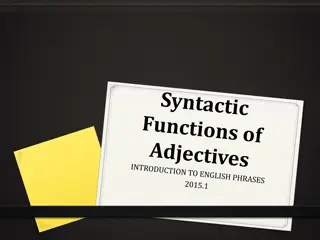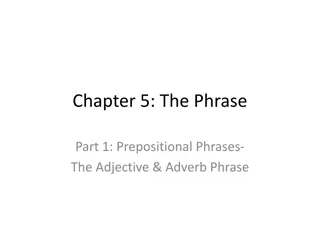Latin Lesson 34 Vocabulary: Adjective Comparisons and Dative Constructions
Learn about adjectives in ER, EUS/IUS, ILIS forms, and how they are used in comparisons. Explore dative constructions with adjectives and enhance your Latin vocabulary with words like "aureus" (golden), "dexter" (right), "difficilis" (difficult), and more.
Download Presentation

Please find below an Image/Link to download the presentation.
The content on the website is provided AS IS for your information and personal use only. It may not be sold, licensed, or shared on other websites without obtaining consent from the author.If you encounter any issues during the download, it is possible that the publisher has removed the file from their server.
You are allowed to download the files provided on this website for personal or commercial use, subject to the condition that they are used lawfully. All files are the property of their respective owners.
The content on the website is provided AS IS for your information and personal use only. It may not be sold, licensed, or shared on other websites without obtaining consent from the author.
E N D
Presentation Transcript
Jenneys First Year Latin Lesson 34 1. Lesson 34 Vocabulary 2. Comparison of Adjectives in ER, EUS/IUS, ILIS 3. Dative with Adjectives
aureus, aurea, aureum golden
cupidus, cupida, cupidum eager, desirous (takes an objective gen., NOT a dat.)
dexter, dextra, dextrum right
difficilis, difficile difficult
dissimilis, dissimile unlike
drus, dra, drum hard, harsh
fidlis, fidle faithful
idneus, idnea, idneum suitable
magis (adv.) more, more greatly
magnopere (adv.) greatly
maxim (adv.) most, most greatly, especially
nisi (conj.) unless, if not, except
nbilis, nbile noble, of high birth, well-known
pr, pris equal
posterus, postera, posterum following, next
poster, posterrum, m. pl. posterity, descendants
propinquus, propinqua, propinquum near, nearby
propinquus, propinqu, m. relation, kinsman
propior, propius nearer
proximus, proxima, proximum nearest, next
validus, valida, validum strong
Comparison of Adjectives in ER, EUS/IUS, and some in ILIS
Comparison of Adjectives in ER adj. with their nom. sg. masc. form ending in ER form their superlatives differently than regular adj. comparative: still formed the same, e.g.: pulcher, pulchra, pulchrum: pulchrior, pulchrius celer, celeris, celere: celerior, celerius superlative: add RIMUS, RIMA, RIMUM to the end of the nom. sg. masc. form, e.g.: pulcher, pulchra, pulchrum: pulcherrimus, -a, -um celer, celeris, celere: celerrimus, -a, -um
Comparison of Adjectives in EUS/IUS adj. with their nom. sg. masc. form ending in EUS/IUS form their comparatives and superlatives differently by adding an adv. before the positive of the adj. comparative: add magis( more ) before the positive of the adjective, e.g.: aureus, -a, -um: magis aureus, -a, -um (decline adj. regularly) superlative: add maxim ( most ) before the positive of the adjective, e.g.: aureus, -a, -um: maxim aureus, -a, -um (decline adj. regularly)
Comparison of Some Adjectives in ILIS some adj. with their nom. sg. masc. form ending in EUS/IUS form their superlatives differently; these are: facilis, facile: easy difficilis, difficile: difficult similis, simile: like dissimilis, dissimile: unlike gracilis, gracile: slender humilis, humile: humble all other adj. w/ ilis in the nom. sg. masc. form their superlatives regularly (e.g. utilis utilissimus, -a, -um)
Comparison of Some Adjectives in ILIS comparative: formed regularly, e.g. facilis, facile: facilior, facilius dissimilis, dissimile: dissimilior, dissimilius superlative: add LIMUS, LIMA, LIMUM to the stem facilis, facile: facillimus, facillima, facillimum dissimilis, dissimile: dissimillimus, dissimillima, dissimillimum
Dative with Adjectives some adj. require a dat. to complete their meaning we call this use of the dat., dat. with adjectives these adjectives are: am cus, -a, -um: friendly* inim cus, -a, -um: unfriendly, hostile facilis, -e: easy difficilis, -e: difficult fid lis, -e: faithful, loyal f nitimus, -a, -um: neighboring gr tus, -a, -um: pleasing, welcome, grateful id neus, -a, -um: suitable *N.B.: when am cus, am ca, and inim cus are followed by a genitive, they are the NOUN, not the adj.
Dative with Adjectives some adj. require a dat. to complete their meaning we call this use of the dat., dat. with adjectives these adjectives are: n tus, -a, -um: well-known, famous p r, p ris: equal propinquus, -a, -um: near propior, propius: nearer proximus, -a, -um: nearest similis, -e: like, similar dissimilis, -e: unlike tilis, -e: useful, profitable N.B. cupidus, -a, -um takes an obj. gen., NOT a dat.
